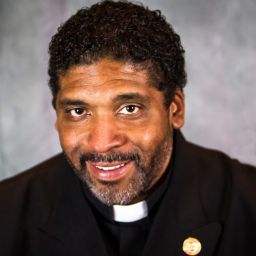Editor’s Note: The Rev. Dr. William Barber II is the co-chair of the Poor People’s Campaign: A National Call for a Moral Revival. The opinions expressed in this commentary are his own. View more opinion articles on CNN.
As the Carolinas brace for Hurricane Florence, North Carolina Gov. Roy Cooper has warned that “disaster is at the doorstep,” comparing projected rainfalls to some of the worst storms in recent memory.
I have been a pastor in Eastern North Carolina for the past 25 years. Together with the community here in Goldsboro and Wayne County, I have been through many of those storms and have participated with local churches in the cleanup and rebuilding that happens after the waters recede. I know from experience that storms like Florence do more than destroy; they also expose the inequities in our society that are perpetuated by extreme policies.

We witnessed this as a nation last year, as Hurricane Maria ravaged Puerto Rico, a US territory that had been neglected in many ways before the storm and suffered afterward from a poor response – one which we now know contributed to nearly 3,000 unnecessary deaths.
While President Donald Trump continues to lie about his “success” in Puerto Rico, millions of my poor brothers and sisters – black, white, brown and Native American – have homes, farms and lives that are lying in the direct path of another storm. Meanwhile, the administration’s attacks on anti-poverty programs and rejection of policies that would expand access for everyone have left poor people the most vulnerable as Florence bears down on us.
For example, hundreds of thousands of people in the path of Hurricane Florence do not have access to health insurance because legislators in both South Carolina and North Carolina refused to expand Medicaid under the Affordable Care Act. While the President and his political allies continue to undermine the Affordable Care Act, poor people in North Carolina become sicker than they need to be because they aren’t receiving basic health care. The public health crisis that a storm brings will only exacerbate this inequality.
What’s more, health care and rescue workers who go into the storm, as others flee, have seen their wages stagnate in recent years. Like the poor farmers, milk workers and underemployed service workers in this region, many cannot leave because they are a part of the 40% of Americans who do not have $400 in savings to pay for transportation or a hotel room.
The children of these families may be sent home from school, but they are still in harm’s way, and many of their families won’t have the breakfast and lunch they would normally receive at school. Along with them, many impoverished elderly and disabled people just have to stay put and pray through storms like Florence. Though federal emergency funds provide limited transportation services to move elderly and disabled people to state-run shelters, many of these shelters lack the medical services that these vulnerable populations require.
Because the President and his supporters in Congress say they want smaller government, they have cut trillions from taxes and have proposed cuts to funding for the Supplemental Nutrition Assistance Program, the Children’s Health Insurance Program and subsidies for health insurance under the Affordable Care Act.
But this leaves all of us vulnerable, with limited resources to respond when storms like Florence impact us all. As Sen. Jeff Merkley’s recent revelations make clear, the administration’s misguided efforts to stop immigrants through its “zero tolerance” policy led to its decision to take nearly $10 million from FEMA’s travel, training and IT investments budget and send it to Immigration and Customs Enforcement.
Though FEMA says it has the resources needed to responded to Florence, and that none of the money diverted to ICE came from the disaster relief fund, we now know that our government’s response will be limited by its determination to pursue an extreme agenda for which a budget was never allocated or officially approved.
The Bible warns that when we sow to the wind, we reap the whirlwind (Hosea 8:7). Because our political leadership has sown to the winds of fear and division, inequality has grown even as the US economy continues to expand. Nothing exposes this disparity like a storm that impacts all of us.
If we, as a people, do not want to reap the whirlwinds of chaos and destruction in our democracy, we must come together not only to take care of one another in the aftermath of Florence, but also to vote in November and build up a nation that works for everyone. If we don’t, we will continue to reap a social whirlwind more disastrous than any hurricane.


